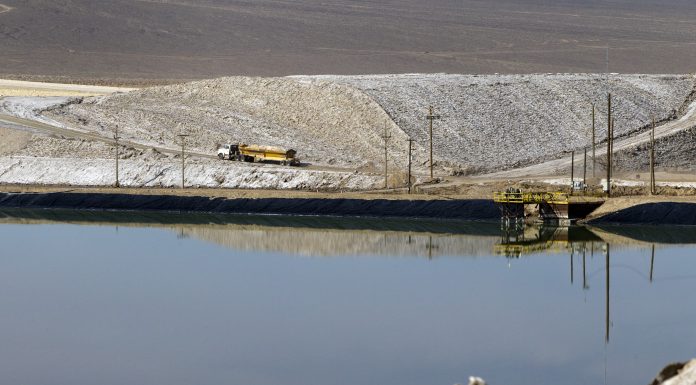(Headline USA) One of the keys to Democrat Joe Biden’s $2 trillion clean energy plan could be a mineral that lies in a salt flat above a prehistoric volcano just south of the Oregon-Nevada line.
The U.S. Bureau of Land Management issued a record of decision on Trump’s final Friday in office for an open-pit lithium mine at Thacker Pass, which is roughly 53 miles (85 kilometers) north of Winnemucca, Nevada.
Lithium Americas, the company behind the mine, believes it can supply a quantity “critical for establishing a strong domestic lithium supply chain required to support a low-carbon economy,” its President and CEO Jon Evans said in a statement.
Lithium, long used for rechargeable batteries found in cellphones and laptops, is expected to become an increasingly valuable commodity if the new administration pushes carmakers to scale up electric vehicle production. But its extraction has splintered environmentalists.
While technologists are eager to use it to transition away from fuels that emit non-toxic carbon dioxide, conservationists worry about the impact new mines have on endangered species and the environment.
The approval of the mine is among several eleventh-hour decisions issued by Trump’s Department of Interior to advance energy and mining projects, including a West Virginia oil pipeline and an Arizona copper mine on land the San Carlos Apache Tribe considers sacred.
Unlike those decisions, which could be reversed, Thacker Pass procured the final federal permit needed to begin construction — one difficult to overturn.
“We are not going to fix the climate if we don’t do it right,” John Hadder, the executive director of Great Basin Resource Watch, said of the approval. “There’s nothing ‘green’ about sloppy permitting.”
Hadder said he worries efforts to usher in a “green revolution” overshadow the need to adhere to established environmental review processes required under federal law.
Shielded by Trump’s executive orders streamlining reviews, he said the project’s environmental impact statement was roughly one-third the length of reviews prepared for similar-sized projects.
Hadder said the lithium mine will harm wildlife, including sage grouse, and threaten water and air quality.
Unlike other projects fast-tracked in Trump’s final days, lithium production could bolster Biden’s plans to transition the economy away from fossil fuels.
The Trump administration listed lithium among the minerals critical to national security and, amid trade disputes, thought mines could help wean the country off of foreign supply.
For Biden, boosting domestic production could potentially lower the price tag on a key component of his climate plan: offering rebates to consumers to trade in gas-powered for electric cars.
Biden’s Department of Interior did not respond to request for comment, but a Wednesday executive order revoking permits for the Keystone XL oil pipeline mentions plans “to both reduce harmful emissions and create good clean-energy jobs.”
And in October, his campaign reportedly told miners that he wanted to increase lithium production domestically.
The enthusiasm could put him at odds with conservationists, who are fighting another proposed Nevada lithium mine they say would destroy Tiehm’s Buckwheat, a desert flower not known to exist elsewhere.
Australia-based mining company Ioneer Ltd. is developing plans to mitigate damage to the flower by trying to grow replacement plants. The executive chairman of its board doesn’t understand why environmentalists want to prevent development of a key element to future “clean energy.”
“Climate change poses an immediate threat to all the species on Earth,” James Calaway said late last year. “This will enable the nation’s transformation from oil and gas drilling to renewable energy.”
Much of the world’s lithium supply comes from Australia and South America, where Chinese firms are heavily invested.
Thacker Pass would be the second commercial lithium mine in operation in the U.S., following a central Nevada facility that plans to invest $30 to $50 million to double production.
Elsewhere, thousands of claims for the mineral have been staked on federal lands by speculators who anticipate carmakers will expand investments into electric vehicles.
Lithium helped lure Tesla to Nevada. The company opened a massive battery factory near Reno in 2016. The state sees the mineral as key to diversifying its tourism-reliant economy and Democratic Gov. Steve Sisolak mentioned it specifically in his Tuesday State of the State Address.
Lithium Americas said in a statement that the company now plans to seek financing for the project. Nevada has offered the company $9 million in tax rebates over a 10-year period.
The mine is projected to require 1,000 jobs during construction and 300 once completed, generating roughly $75 million in state and local tax revenue over a decade.
Humboldt County Commission Chairman Ken Tipton said the mine has garnered some local opposition, but most support it for the jobs it could bring.
“Anytime a county of our size gets the amount of jobs they’re talking about, it’s a real boon for our economy,” he said.
Adapted from reporting by the Associated Press.

